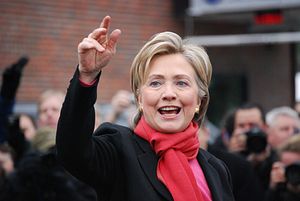The race is on as aspiring Democrat and Republican contenders begin laying the groundwork for their 2016 presidential campaigns. Without a doubt, foreign policy, specifically Asia policy, will be a paramount issue in the 2016 contest. From Ankara to Canberra, Beijing to Baku, the Asia Pacific region fuels economic dynamism and technological innovation, yet festers with security flashpoints and societal fault-lines. Asia hosts traditional and non-traditional security threats that the next administration – Democrat or Republican – must manage effectively vis-à-vis U.S. national interests. Asian policymakers, industry decision-makers, security strategists, and civil society leaders should closely watch how presidential candidates articulate Asia’s strategic relevance. The more clearly and consistently Asian leaders elucidate their views of U.S. engagement in Asia, the more it could help illuminate the next White House’s Asia policy.
U.S. presidential candidates’ positions on four key strategic drivers warrant scrutiny on the campaign trail:
Security Architecture. Will the U.S. maintain its “pivot” to Asia? In the post-911 era, security stakes are growing higher and more diffuse. Multiple, cross-border challenges – Islamic extremism, cybersecurity, territorial and maritime disputes, etc. – pose critical threats to Asia’s stability. With Asia as home to 62 percent of the world’s Muslim population, radical Islamic groups, such as Islamic State (IS) and Al-Qaeda, including their respective affiliate offshoots, have found breeding grounds across Asia. North Korea’s aggressive cyberattacks and recalcitrant leadership stoke regional tensions. Disputes in the East and South China Seas over territorial sovereignty have future implications for which code of conduct will prevail over these strategic sea lanes. Effective American and Asian collaboration on these and other challenges is a constructive step toward building a regional security framework.
Trade and Investment. What role will the U.S. play in Asia’s economic growth and integration?
With the Transpacific Partnership (TPP) as the centerpiece of the current White House’s pivot to Asia, TPP is a litmus test of U.S. leadership on regional trade and investment. President Barack Obama’s request to Congress for trade promotion authority in his recent State of the Union address signals the presidential priority placed on completing the TPP by the end of 2015. As the TPP develops, how the new administration handles China’s prospective inclusion has long- term implications for U.S. leverage in facilitating the region’s economic integration and job creation at home.
Civil Society. How will American leadership in philanthropy, education and social media contribute to the growth of civil society across Asia? The role of civil society is more important than ever in fostering greater transparency and accountability in Asian state-society relations. As a blend of American philanthropic expertise and Asian values, Asian philanthropy, in our previous Diplomat article, is an emerging force in the development of Asia’s civil society. Impact investing in education, environment, health and the arts, enables empowerment in areas where government is limited. With increasing numbers of Asian students seeking education in the United States, an American education instills civic awareness and social responsibility. Institute of International Education 2012 data indicates that 57 percent of international students in the United States came from Asia. Social media platforms facilitate free-flowing, real time communication as an antidote to state-controlled media. Of Asia Pacific’s 4 billion population, 3.7 billion have mobile connection, and one billion have active social media accounts, according to Singapore- based We Are Social’s market research. Last year’s student-led demonstrations in Hong Kong underscore the impact of social media in galvanizing civil society.
The China Factor. How will the new U.S. leadership frame bilateral relations and U.S. China policy? China’s ubiquitous reach is reshaping Asia’s strategic landscape at the expense of U.S. crisis management in other global flashpoints. On the security and economic fronts, China is fashioning itself as a countervailing force to the United States. In May 2014 at the fourth annual summit of the Conference on the Interaction and Confidence Building Measures in Asia (CICA), Chinese President Xi Jinping offered a new Asian security concept for new progress in security cooperation. As a Chinese-led vision for Asian security, the new concept of “Asia for Asians entails an overhaul of Asia’s security structure with a drastically reduced role of the United States,” opines China expert Minxin Pei. The launch of the Silk Road Fund – a $40 billion infrastructure and trade financing mechanism – and the Asian Infrastructure Investment Bank – a China-led regional investment institution to rival the Asian Development Bank and World Bank – clearly signals Beijing’s growing regional and global leadership ambitions. Effectively steering the future direction of U.S.-China relations will require Beijing and Washington to focus on shared interests and win-win solutions that enhance regional stability and prosperity.
The next administration’s priorities and approach toward Asia may differ from that of the current White House. As the candidates officially confirm their presidential bids in the coming months, Asia’s key stakeholders could offer insights into how the next U.S. president should navigate a new course of U.S. engagement with Asia.
Mercy A. Kuo is Chief Strategy Officer at CHINADebate and formerly a senior project director and director of the Southeast Asia Studies and Strategic Asia Programs at the National Bureau of Asian Research, a US-based foreign policy think tank. Angie O. Tang is Senior Advisor of Asia Value Advisors, a leading venture philanthropy advisory firm based in Hong Kong. She served as U.S. Secretary of Labor Elaine Chao’s spokesperson and regional executive.

































